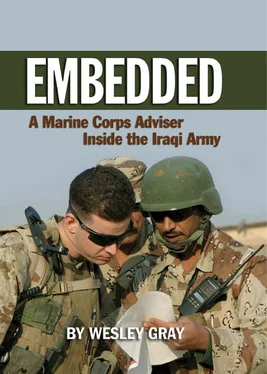Qutaiba scooted his chair closer to mine and came within six inches of my face, just close enough so I could feel his warm breath on my cheeks. “Jamal, my entire company staff was murdered, my business was shutdown, I had both hip bones replaced, and I underwent ten surgeries on my chest and arms. The terrorists took everything from me. But do you know what they did not take, Jamal? My fighting spirit. They can never take that from me. I will never give in to the terrorists.”
Chapter 21
Wayn Jundi ? (Where Are the Soldiers?)
November–December 2006
Ifinally got a grasp on the numbers coming back from the leave run. The situation was truly dismal. We had a grand total of 197 soldiers on hand, and I wasn’t even sure that number was correct. More important, our battalion was left with a total of five officers, which meant that Iraqi leadership was nonexistent. Additionally, half of the 3rd Company jundi who operated out of Camp Ali were AWOL (absent without leave). We barely had enough people to run a platoon-sized patrol operation, yet we were still considered an Iraqi battalion on all official records.
The Battalion Comes Apart at the Seams
The reason for the complete lack of personnel was very simple: The Iraqis had decided to go on “extended” vacation, probably because of the recent violence in Baghdad and the spike in sectarian warring that had curbed the jundi ’s desire to fight in Al Anbar when they had plenty of fighting to do near their homes. Of course, the Iraqis had been taking extra vacation throughout our deployment, so I wasn’t sure this was the complete answer.
There was nothing we could do about the extended leave except report the issue up the MiTT chain of command and hope disciplinary action was eventually taken at the MOD level. But I was highly skeptical MOD would do anything about the situation. They were on their knees begging for more soldiers and couldn’t afford to lose any more. Any sort of crack-down on the current jundi who decided to take extended leave would only have worsened the personnel crunch. The MOD had already had to rehire every soldier who had been fired due to disciplinary actions.
As if the actual numbers weren’t bad enough, to make matters worse, none of the S-1 administration section had returned from leave. Ironically, the people who were supposed to count the jundi weren’t even here. It looked as though I was now the S-1 clerk for the Iraqi army. Of course, at this point I was not too concerned about the problem. I had given up hope on the Iraqi army being anything more than a bunch of thugs, beggars, thieves, and desperate men with uniforms and AK-47s. There was no use stressing over the reality of the Iraqi army.
Let me be perfectly clear and state up front that my morale at the time was sky high, even though I hadn’t seen my wife in four months. If I hadn’t had a wife and a mother who were losing sanity every minute I was in Iraq, I seriously would have contemplated taking some of the jundi up on their offer to provide me shelter, security, and an Arab wife. It might have been cool to hang out in Iraq for a few years to learn more about the fascinating culture.
Nevertheless, I was highly disappointed with the progress we were making with our Iraqi army unit. I knew that some of our battalion’s failures were due to some foolish actions by advisers on our MiTT. Even so the vast majority of the failures were the fault of the Iraqis: they did not give a shit about anything the Iraqi army did and they put more effort into figuring out how to avoid work than they did into actually working. As the saying goes, “You can bring a horse to water, but you can’t force him to drink.”
The biggest issue with the jundi was that they didn’t show up for work. We had been on the brink of a personnel crisis the entire time we had been in Iraq. We had started with about 300 soldiers, which was less than 50 percent of what we were supposed to have in an Iraqi army battalion, and we now sat at fewer than 200 soldiers and had no key personnel or leadership resident to the battalion. We could have moved forward with 200 soldiers—if the leadership had been here. It would have been ugly, but we could have accomplished some basic objectives. But with 197 soldiers on hand, no leadership, and nobody willing to step up as a leader and make decisions, we effectively were left with 197 bums collecting a paycheck.
In Haditha the 4th Iraqi Company was representative of the crisis we faced. Out of the original 59 jundi we had there at the beginning of the deployment, 16 were injured, 10 were AWOL, and 19 had quit—leaving us with a grand total of fourteen. Fourteen soldiers? Were the 250 Marines in Haditha going to turn over security duties to these 14 derelicts with AK-47s? If that was the plan, we wouldn’t be leaving Iraq for the next hundred years. The situation was ridiculous, and if Colonel Abass and the rest of the key officers didn’t return from this next leave period, our MiTT would no longer have a job.
Every time I hear a speech by President Bush touting the progress of the Iraqi army, I wonder if he has looked at any of the data from Al Anbar Province.
Poor morale among the jundi had been growing and was finally reaching disastrous levels. One day the buses from 3rd Iraqi Brigade (based in Rawah, which is west of Haditha) stopped at our camp to rest and refit. A slew of our jundi saw the buses parked outside the camp and immediately packed their bags. In their minds this was their opportunity to quit the army and get out of the area as soon as possible.
The scene at the buses was straight from a comedy movie. Jundi were tripping over themselves trying to transition from their uniforms to their civilian attire so they could get on the bus. I asked Abdulrachman, the nefarious S-1, to determine how many people we would lose. “How many jundi are leaving?” He replied, “Jamal, I don’t know. The number is changing as we speak.”
Although I knew the situation was futile, I called the boss to tell him the news. I knew he would be in a complete tizzy and want to come fix the situation himself. Predictably, Major Pyle came running to the Iraqi COC to get an update on the situation. When he arrived he noticed that the Iraqi leadership was doing nothing to stop the jundi who were trying to flee from Camp Ali. He walked up to my desk and began one of his heroic speeches. “We can’t let this happen. I can’t let this happen. I am going to go out there and stop the jundi from leaving.” He turned to Martin, the terp on duty, and said, “Martin, let’s go. By God, we are going to stop this shit!” Within seconds he was waddling out the door in the direction of the buses. He looked like a puffed-up rooster on his way to a cockfight. I mumbled under my breath, “Good luck, dumbass.”
Why the boss wanted to stop the jundi from leaving on the buses is beyond me. We already knew there was going to be a huge number of jundi quitting after the next leave run, which would occur in seven days. I figured we should let the quitters go early so we could save on food and supplies. More important, we would give the quitters less time to think up schemes to steal shit from the camp as their parting gift.
Not surprisingly Major Pyle was unable to stop the buses before they could leave. I just didn’t think the guy got it. What was the point of wasting everyone’s time to keep a few jundi from quitting when they were going to get on a leave bus in seven days and quit anyway? I guess common sense is not a common virtue in the Marine Corps.
Читать дальше












